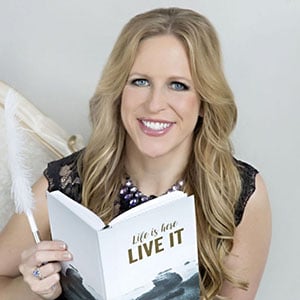Looking for self-confidence journal prompts? Need confidence journal ideas for adults?
You’re just NOT feeling like your most confident self right now. You’re struggling to have the courage and confidence to just start, to put yourself out there, or to even leave your comfort zone.
Confidence comes through action. Confidence comes through belief in ones self. So, how about we start there?
Sure, you could build confidence by facing your fears and doing something new, but you can also become a more confident person through journaling. The right journal prompts can develop self-esteem for adults.
Journaling is a process of self-reflection and self-exploration, that can help you to not only better know yourself, but to find your most confident self.
To help you build up your self-confidence and self-esteem, here are 17 self-confident journal prompts and ideas for adults. All that’s required is for you to take the time to pick up your journal and write. Choose one, or do one a day, whatever works for you.


THIS POST MAY CONTAIN AFFILIATE LINKS.
IF YOU MAKE A PURCHASE FROM THESE LINKS, I MAY EARN A SMALL COMMISSION.
CLICK HERE FOR MY FULL DISCLAIMER STATEMENT.
17 Self-Confidence Journal Ideas for Adults
#1. Get to Know Yourself
In my opinion, the best thing we can do to boost our confidence and self-esteem is to get to know ourselves. To fight poor self-esteem, we have to understand what caused in the first place and understand our reactions to negative feedback we get from other people.
This is not a quick-fix solution. However, it will help in the long term. To do it, I suggest writing a journal or thinking and writing about all situations that made us uncomfortable and insecure in the past.
Furthermore, we should try to rationalize our reactions and explain logically what was happening. Doing those things consistently, over time, will help in boosting morale and overall confidence.

Dr. Nikola Djordjevic, MD, Medical Writer & SEO Specialist
Nikola is a board-certified family physician and SEO specialist. Eager to learn, improve, create, and mend, he found his true calling in creating and managing health-related websites, like Health Careers.
#2. Journal of Your Successes
You can add anything, a great meal you cooked last night, organizing a lovely day out for friends, helping a cat out of a tree, finishing that lengthy project at work, walking 10m, add anything and everything. Make the list as long as possible. Go back to it and add more things every day or week.
By doing this you are rewriting that negative story in your mind with a good, positive story. You give yourself ammunition for when the “bad thoughts” inevitably set in, so that you can remind yourself that you ARE worthy, and you ARE deserving.
You are constantly reminding yourself of your worth and how amazing you are, that you do deserve that promotion and you do deserve to be loved.
The exercise is designed to rewire the pathways, and how you think, in your brain. I like this method when I’m questioning myself at work, on whether I’m doing as good a job as the next person, do I deserve that pay rise. Then I look back at everything I’ve achieved and remind myself that I DO deserve that pay raise, I am worthy.

Lynette, Girl Has a Mind
Lynette’s mission in life is to help others become their best self, grow more positive and confident… and be HAPPY! At Girl Has a Mind you’ll find articles on personal development, gratitude, love, confidence, and much more, like How to Build Self-Confidence and Self-Esteem & Become More POSITIVE.
#3. Re-Route Your Brain
I’ve found that journaling can be a great tool for boosting your confidence and self-esteem. Whether you’re writing little pep-talks to yourself or venting about your feelings, journaling can give you both clarity and confidence.
Here is a great way to boost your confidence through journaling:
- Take a few minutes to jot down your thoughts, doubts, and insecurities.
- Then, imagine your friend was saying those negative things about herself and write out how you would respond. Likely you’d tell your friend that she is beautiful and capable of handling anything thrown her way.
Journaling like this regularly will re-route your brain from thoughts of self-doubt to ones of support and self-confidence. The more you journal like this, the more you’re teaching yourself to respond to your inner-critic with love instead of fear. Confidence takes time to grow, but implementing little changes like this can make a huge difference in the long run.

Laura Maloney, The Self Set
Laura Maloney is a twenty-something coffee-addict, self-help junkie, and mental health advocate. She is all about adding self-compassion to life; she practices authenticity and self-love everyday and wants to help others do the same. At The Self Set you’ll find blog posts for self-care, self-love, and self-improvement.
#4. Revise Self-Sabotaging Stories
My #1 way to build confidence and self-esteem is to pay attention to my inner storyteller. How we tell our life stories, inwardly to ourselves and outwardly to others, matters. We all make mistakes, get hurt, and experience setbacks and/or hardships. We all have strengths along with areas we can grow in. None of this makes us weak, damaged, or less-than. It just makes us human.
When I started paying attention to how I was framing these difficult pieces of my life, I realized the incredible power my inner storyteller wields. It can build me up or tear me down, sabotage or support me.
Who ultimately gets to decide which version I believe? Of course, the answer is me. So, I chose to go back and revise some of my most self-defeating stories, highlighting the positive. And, I started consciously choosing how I craft the stories unfolding in my life now, making sure they work for me instead of against me.
This shift has made an enormous difference in my confidence and self-esteem. It’s helped me step into courage, grace, and the willingness to let my authentic self be seen.

Rose Hahn, Yoga Therapist
Rose has a passion for inspiring intentional wellness which has evolved from a personal practice to working as a yoga teacher and yoga therapist, to founding the first neuroscience and mindfulness-based addiction treatment center in Texas. In her wellness blog, she shares tips and insights that will help you find and sustain your health and happiness such as How to Harness Your Inner Storyteller a & STOP Self Sabotage.
#5. Know Your Baseline
In order to build confidence and self-esteem, you need to know your baseline.
- Where are you now?
- When you are alone and looking in the mirror what do you see? We all have room for improvement as we are not perfect.
- However, do you have an appreciation for where you are now?
- Can you appreciate what you have gone through to become the person standing in front of you?
Write everything you are feeling down and continue to have an open and honest dialogue with yourself. Don’t sugar coat your feelings, really experience them and gracefully accept them.
Now that you know your baseline you will notice through your journaling that you are growing every day. Continue to give yourself grace while appreciating your small steps in the right direction. As you will do you will see yourself becoming stronger physically, emotionally, and spiritually.

Brianne Cook, Straight Outta The Laundry Pile
Brianne Cook of Straight Outta The Laundry Pile is a mommy blogger from the midwest. She strives to help women who feel like they can’t be important if they don’t meet specific criteria. By posting motivational content she hopes to spread her message to women all over the world! She shares How to Find Yourself When You Are Lost.
#6. Change Your Self-Descriptions
Lack of confidence permeates the way people talk about themselves. If, in our self-descriptions, we are indirect objects rather than subjects (that responsibility isn’t given to me, my boss doesn’t trust me, they don’t think I can handle it), or we are passive rather than the active (I was sidelined), we craft a narrative diminishing ourselves.
That language alters our brain’s perception and impacts our experience. If our speaking has us as objects and in a passive role, we perceive ourselves as lacking agency, control, and power. When I coach my clients, this is one of the things we work on.
I recently assigned a start-up CTO to begin a spreadsheet tracking each time he caught himself thinking or speaking that way and then altering the structure at the moment. By switching his language, he can build an experience of ownership and agency over his self-image, capacity, and future. Since confidence comes from the stories we tell ourselves about ourselves, when we switch the story we switch our experience.

Amie Devero, Consultant and Coach
Amie Devero is a strategy consultant and executive coach to post-revenue startup founders and leaders. She has more than 25 years of experience as an executive coach and management consultant.
#7. Create a Celebration List
I believe building self-esteem starts with acknowledging and celebrating where you are right now, in this moment! Oftentimes, we are so busy looking ahead or focusing on what we still have to accomplish, that we forget how far we’ve come.
One of my favorite rituals that I recommend to all of my coaching clients is to create a celebration list! This is something I do at the end of every month but you can also do it at the end of the week or even day. Take a moment to reflect on all of the things you have to be proud of, both big and small.
Oftentimes, we’ve accomplished so much more than we give ourselves credit for! Doing this builds the positive momentum to help us continue to feel good about ourselves and strive for more.

Ashley Rachel, Mindset and Self-Love Coach
Ashley Rachel is a mindset & self-love coach for spiritual entrepreneurs who are ready to embody deeper self-love, self-worth, and self-trust so that they can share their light with the world
#8. Write Down What Went Well
My number one trick to increasing confidence is deceptively simple: at the end of each day, write down everything that you did well or even just okay during your day.
The brain is primed to seek out the negative, especially when we are in a state of growth. It’s easy to fixate on everything that isn’t quite right yet. In doing so, we miss all the ways that we are actually already doing so well. This process arms you with huge amounts of evidence of how awesome you actually are and how much you are achieving your goals.
This technique is a form of Cognitive Behavioral Therapy, that looks at changing our thoughts in order to change our actions and ultimately our lives. It can take a couple of days or even a week before you start to feel the impact, but every time I do this, I can feel my confidence level up.
When things don’t go as well as I’d like, it no longer derails me. It’s just one piece of feedback. You can also always look back at these lists if you are feeling down and you’ll get an instant boost of confidence and positivity.

Louisa, The Actually
Louisa Liska is all about working smarter, not harder, and loves sharing tips on how to actually get things done. After experiencing major burnout after leaving school she realized that the key to working smarter was to be intentional and mindful about HOW she was working. Her blog posts range from productivity, mental health, and personal development. Her article, Cognitive Behavioral Therapy (CBT) Primer, explores how to change your mindset by using just one simple practice – writing down what you did well for the day.
#9. What You Love About Yourself
To quickly build self-esteem, text or call four of your closest friends or loved ones. Ask each one of them: what are four words that describe what you love most about me or find the most unique about me? Maybe it’s how compassionate and giving you are, or perhaps it’s about your ambition or the way you make people laugh.
Whatever comes up, write down all sixteen of the words in a journal, and then go ahead and ask yourself the same question.
- What do you love most about yourself?
- What words come to mind about what makes you stand out in this world?
Take your time, and be gentle with yourself. Before you know it, you’ll have twenty beautiful values or mantras to help you remember just how incredible you are. Notice what themes came up from the exercise, and then give yourself permission to celebrate how wonderful you are!

Antoinette Beauchamp, Empowerment Mindset Coach
Antoinette Beauchamp is an empowerment mindset coach, speaker, author, and mediation teacher.
#10. Reflect on Your Successes
As an entrepreneur, I’m all too familiar with confidence and self-esteem issues. So many new entrepreneurs (especially women) are often overwhelmed by feelings of imposter syndrome and being in over our heads.
My tip to increase confidence is – at the end of each week – take some time to reflect on your successes. What went well in the last week? Why was it successful? How did overcoming that obstacle or achieving that goal make you feel?
It’s so easy for us to rush through our lives constantly focusing on what we have to do next and what we’re doing wrong. Don’t forget to stop and congratulate the success you’ve had, even if it has been small (ex. I spent an hour researching web design templates last week). Small steps lead to bigger achievements, but each step is essential. However, if we don’t look down and see those steps, we won’t realize how far we’ve walked.

Meg Marrs, Founder of Safer Senior Care
Meg is the founder of Safer Senior Care. She was inspired to create a senior care resource after witnessing many elderly individuals struggle at home
#11. List Your Blessings
I used positive self-talk to get me back on my feet after undergoing chemotherapy two years ago. After losing my hair, sense of self, and full identity at the age of 20 from the toxicity of treatment, my confidence level was extremely low.
The way that I got out of this fret to boost my confidence was by first making a list of all of my blessings. I would then look at myself in the mirror and affirm myself of these positive aspects in my life. I am becoming stronger and stronger each day. I am going to heal and achieve all of my dreams.
I am confident with who I am becoming from my experience and cannot wait to see what life has planned for me next. I am on the right path and everything is happening for a reason. This ultimately gave me enough courage to go back to school after taking a year off to undergo treatment, write a book, become a best-selling author, get invited to leadership conferences, and speak at schools about how I persevered.

Alexa Nicole Cucchiara, Author
Alexa is an artist, author, and wellness advocate. Halfway through her undergraduate studies, she battled and beat cancer. This led her to create her current platform which she uses to encourage and motivate others to live their best lives despite unforeseen circumstances. Her book, Power to Persevere is an Amazon #1 best-selling book and is helping people in the cancer space.
#12. Create a Reminder
My #1 tip for building confidence is to create a reminder. On a piece of paper or in your Notes app, write all of the details as you reflect on a time you felt you are most confident. Close your eyes, take a few breaths, and go back to that moment.
- What were you doing?
- What did you wear?
- What smells were around?
- Were you eating anything?
- Who was there (colleagues, family, partner)?
- What feelings and emotions came to you during that moment (joy, eagerness, fierceness, courage)?
- What time of day was it?
- What words were said and how did you stand or sit that made you feel confident?
- Did you capture that moment in a picture?
Now, get your “Being Mary Jane” on and tape that confidence booster to your bathroom mirror, car dashboard, any place you need it as a reminder of how you exude confidence in all you do and you’re a badass!

Melody, Anti-Domestic Violence Advocate
Melody is an anti-domestic violence advocate, a blogger, a speaker, and a coach. She works to help mothers get free from the burdens and expectations placed on them and survivors who want to gain a new sense of normalcy after experiencing abuse.
#13. Practice Self-Compassion
Self-compassion builds confidence and self-esteem, because inherent in self-compassion are the assumptions that it’s okay to be messy, make mistakes, and be an imperfect human. When we hold the expectation that we need to be perfect or feel secure all the time in order to be confident we set ourselves up for failure. Resistance to feeling insecure just creates more suffering.
Practicing self-compassion includes:
- noticing and naming that you are feeling insecure or down,
- reminding yourself that no one is perfect and our imperfections are actually the glue that connects us to others, and,
- sending yourself kind words like, may I accept myself exactly as I am. You can also do compassionate behaviors for yourself (anything that feels pleasurable, fun, or relaxing).
People often recoil at the first mention of self-compassion, but research has shown that self-compassion is associated with lower depression and social anxiety symptoms that frequently coincide with low self-confidence.

Dr. Justine Grosso, Psychologist
Dr. Justine Grosso is a psychologist who helps her clients feel accepted and transform unhelpful habits into healthier living. On her website, she offers free resources for meditation, mindfulness, and self-compassion.
#14. Begin a Gratitude Practice
Beginning a gratitude practice is the absolute best tool for improving self-esteem and confidence. Gratitude is an instant mood booster and completely shifts the way that you perceive yourself and the world around you.
The best way to implement a gratitude practice is simple: list out loud or in a journal 5 specific things you’re grateful for at the same time each day and whenever you’re in a self-esteem slump.
The real impact comes from specificity. Meaning, rather than being grateful for the fact that you have your beloved dog, describe the cuddle session you had that morning and how it made you feel. Gratitude improves your outlook and helps you to see the positive aspects of your life which is absolutely essential when looking to improve your self-perception.

Haley Neidich, LCSW
Haley Neidich, LCSW is a mental health expert and a licensed mental health professional in private practice specializing in anxiety, relationship issues, parenting, and PTSD. She is a graduate of Columbia University School of Social Work and was previously on the clinical faculty of Yale University School of Medicine prior to founding her private practice. Haley is a passionate advocate for the use of mindfulness and meditation in mental health treatment, particularly in improving anxiety disorders and chronic stress.
#15. Write Your Worries Down
Write your worries about yourself in a notebook and leave three or four lines of blank space underneath. Your worries could include general things like, “I’m always saying the wrong thing,” or “I am not good at coming up with ideas.” The worry section could also include specific events like, “I know when I talk to my manager on Tuesday, I’m going to feel flustered and look like I don’t know what I’m doing,” or, “I’m not good enough to take this chance.”
When an event or situation that caused your worry happens, write the result. Sometimes nothing you worried about came true and sometimes it did but how you handled it revealed your strength. After a couple of months of keeping this record, you’ll be able to look back and see how you have overcome. Your own success can boost your self-esteem because you’ll know that if you did it before, you can do it again.

Melanie Musson, Youth Counselor
Melanie Musson is a writer for EffortlessInsurance.com. She is a youth counselor and spends her summers working in youth camps.
#16. Write A Live It List
It started when I wrote down 12 things to boost my confidence. I committed to doing one a month. It was driving a race car to flying a plane to go dog sledding. When I told people I read in my bucket list and was doing one thing a month I thought I was dying so I trademark the live it list and I still do one thing a month and now I grant live it list experiences.
I’m a survivor of domestic violence and in 2010 I believed I didn’t even know how to park a car or boil water. Even though I was on TV and did a radio show from the outside it looked like I had all the confidence in the world but inside I had none.
My live it list saved me and now it’s an inspiration for other people to help boost their confidence and give them some happiness.

Nicole N. Middendorf, CDFA
Nicole N. Middendorf is a money maven, a knowledge junkie, and a born coach. She is an entrepreneur who left Morgan Stanley in 2003 to run her own wealth management firm. Nicole is the author of five books, a world traveler, philanthropist, and an accomplished public speaker.
#17. Reconstruct Your Thoughts About Yourself
One of the best ways to build confidence and self-esteem is to reconstruct our thoughts about ourselves altogether. That sounds daunting, I know, but the strategy I’m about to share is actually pretty simple.
First, take some time and pick out at least five things that you like about yourself, that you’re good at, that you’ve accomplished, etc. If you list more than five things, even better!
- Then take a piece of paper and draw a line down the middle to make two columns.
- On the left side, write one of the “lies you believe about yourself” (because they really are lies).
- Then in the right column, write down one of your positive affirmations that combat that lie.
- Repeat until you’ve covered all of the negative thoughts you can think of.
Now, every time you have a negative thought, repeat the positive one to yourself to combat it.
After the destructive thought passes, use an “I feel like…, but I know that….” statement. For example “I feel like I am not talented enough to be successful, but I know that I am hardworking and dedicated enough to accomplish great things”.
You may want to keep the list with you as a reminder while you’re getting used to thinking this way.
Getting into the habit does take some time, but I promise, it will truly transform the way you think about yourself.

Keegan McCue, Author
Keegan McCue is the author and founder of the Articles of Hope. She has a B.A. in Psychology, a heart for helping people, and dreams of creating a community where people can talk openly and freely about the challenges they face in everyday life.
Get Your Self-Confidence Quotes
Looking for quotes for your self-confidence journal? Ready to boost your self-esteem with journaling? Get your 10 FREE printable self-confidence quotes!
They’re perfect for your office, home bedroom, or wherever you need to find inspiration daily. Each design is black and white and features brushed ink letter detailing.
This download comes with 10 high-resolution graphics ready to be printed and posted.
Start Your Self-Confidence Journal Today
Ready to boost your confidence with journaling? Use this amazing advice for self-confidence journal prompts from our experts. All you need is to take the time to sit with your thoughts.
Open up your journal, bullet journal, or even a blank document on your phone or computer. Read a self-confidence journal idea and start writing.
The answers to why you don’t feel as confident as you’d like to, why you’re struggling with self-esteem or self-worth, are waiting for you in the pages of your journal.
Take it easy on yourself, just do one journal prompt at a time. Whether that’s as part of your morning routine or perhaps at the end of your day as part of your nighttime routine. All that matters is that you take the time to write.
Happy journaling for self-confidence! You got this!

Which self-confidence journal prompts do you like best?
Last Updated on February 20, 2025






